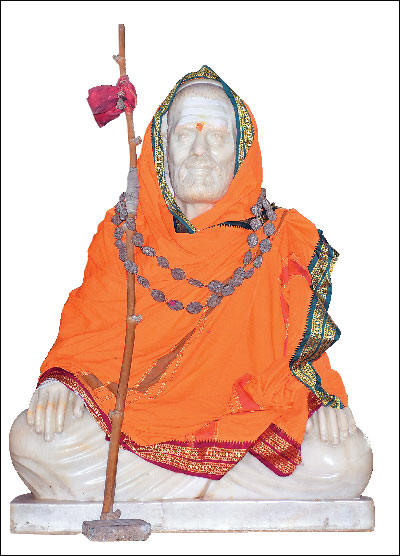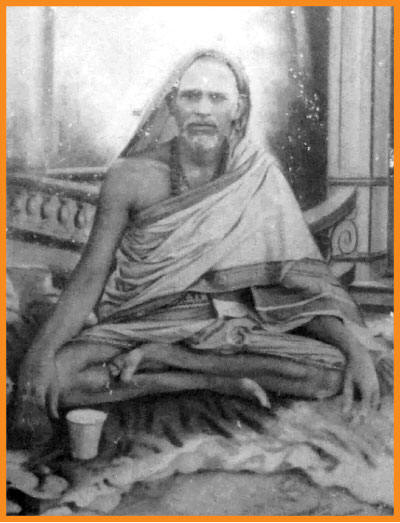Posted Date : 06:00 (20/11/2018) Sakthi Vikatan
திருவருள் செல்வர்கள்! - 16 - மண்ணெண்ணெய் நெய்யான அதிசயம்!
Divine Grace Staretsy – 16 – The Wonder of Kerosene Becoming Clarified Butter
Author: பி.என்.பரசுராமன் (P.N. Parasuraman)
SrīŚivasidhāṉantha Swāmigaḷ
In compliance with the supplication of many Aḍiyārs (Servitors of gods), the temple officials chose a day for the Kumbhābishekam of three gods at the temple: SrīSīthārāmar, SrīSanthāṉa Gōpālar, and SrīYōganarasimhar. The officials arranged for chanting by Vēda Pārāyaṇa Gōṣṭhī (Vedic Chanters) and Tiruvāymozhi-Divyaprabhandha Gōṣṭhī (Gōṣṭhī = ensemble chanting Vedas and Sacred poems before the deities).

A Mahāṉ (Starets) was at the forefront performing the Kumbhābishekam services. Ten days before the event itself, the recitation of Vēdapārāyaṇa Gōṣam (Veda-chanting sound) and the Tiruvāymozi-Divyaprabhandam Gōṣtis (the reciters) were in full swing. 2
The Mahāṉ blessed the Vēdhiyars (Vēda reciters) and told them, “If you recite the Vedas earnestly, you will know its power later. 3
For the piratiṣṭai (Establishing a deity in the new temple = Consecration)), five-metal Yantra plate was ready on hand. Mahāṉ drew a circle with his own hand on the plate. Later the plate was locked up in a special box, and an important official took charge of the key. 4
Every day, at the beginning of the recitation of Vedas, the official brought the Yantra box and opened it before the congregants. Once the recitation is complete, the official weighed the Yantra Plate, made entries of all particulars and announced his findings before the assembly. Soon thereafter he locked and sealed the box with the Yantra Plate. 5
Judges and goldsmiths supervised the events associated with the Yantra Plate and the box. As the days passed and because of the greatness of the earnest and sincere recitation, the Yantra plate gained weight and its color changed to yellow and the day before the consecration, to complete gold. 6
The assembled people were wonder-struck and praised the Mahāṉ, who said, “It has nothing to do with me and the credit goes to the greatness of our Vedas. The plate transmuted from ordinary metal to gold. Mahan took and placed it before SrīRāmar. 7
That wonder happened in Tirukkuṛṛālam SrīDatātrēya Mantrālayam — Srīsiddhēṣvari Pīḍam. SrīŚivasidhāṉantha Sarasvatī Swāmigaḷ, also known as SrīMauṉāntha Swāmigaḷ, was the Mahāṉ performing this wonder on July 5, 1919, the year of Siddhārthi, Āṉi month, 20th day, Sapthami Thithi (7th digit of the moon), Friday, and Uththira Nakṣatram. From now on, he is a Swāmigaḷ. 8
In SrīDatātrēya Mantrālaya SrīSwāmigaḷ demonstrated another wonder. 9
At SrīDatātrēya Mantrālayam ‘s southwest corner SrīSwamigaḷ conducted consecration of a huge Vinayakar. The crowd was large. Vinayaka’s huge corporeal form and beauty were appealing to the eyes and imagination. Once the consecration was over, the idol moved a little, which made the near people wonder. 10
Reason for movement? The Vinayaka’s thigh showed pulsations (of femoral artery) as in people! 11

At that moment, doctors examined, palpated, listened to femoral artery pulsations and declared that the femoral pulse flow was normal. 12
There are idle talkers everywhere. Some said, “Get out of here. How could it be possible that a granite rock idol can exhibit a pulsatile flow? They might have implanted a pulsating machine under the rock surface.” Some invited some geologists to examine the idol in multiple modalities. 13
The geologists declared, “Inside the vigraha (idol), there is no mechanical contrivance. The idol has natural pulsations.” They were surprised and flabbergasted. 14
More importantly, many examined the Vinayaka idol by different modalities. Swamy raised no objection and observed, “I am not the only one child of Vinayaka. Others are also his children. They play with the five-handed Vinayaka with love. Let them play. “Exhibiting such a mature attitude, he just stood there and watched the spectacle. The pulsatile flow lasted for days. 15
Swāmygaḷ said, “I am a devotee of Subramaṇya. Because of it, his first consecration was of Thaṇdāyuthapāṉi, and because of the deity’s power, he performed the consecration of other deities. Srīswāmigaḷ had such close relationship with Murugapperuman. As if to prove it, he quoted Aruṇagiri Nāthar’s Tiruppukaz’s saying, ‘Whatever may be the servitor’s legitimate need, let Perumāḷ give it with grace.’ He demonstrated an event as if to prove the veracity of Aruṇagiri’s saying. 16
In SrīDatātrēya Mantrālaya, Navarātri festival was celebrated most grandly. Once, elaborate and extensive preparations were taking place. 17
The responsible officials were to use ghee for the sweet preparations. Arrangements were made to procure ghee, which did not come at the appointed time. There was no time to go out and buy ghee. It may not be available for an emergency. The Laddu preparer and others did not know what to do and thought they couldn’t make Laddu without the ghee. 18
SrīSwāmigaḷ received the news. He said, “I will prepare ghee right away. Bring me a makeshift open-air charcoal hearth and a big steel vessel. Also, bring two barrels of kerosene. All of them were brought to him immediately.”19
The hearth was alive with fire, and the steel vessel was hot. The servants poured kerosene in the vessel, and Swāmigaḷ squeezed herbs and poured the juice into the vessel. After a while, the vessel was brought down. 20
What a surprise! The entire lot of kerosene transmuted into fragrant, pure ghee. The food preparers made five thousand Laddus. During the whole of Navaratri celebrations, Laddu’s were distributed. No one was sick from eating it. 21

Swāmigaḷ, whom the servitors sought for help, sought the home of his servitors to help them with their hardships and problems. 22
Ramanathan retired from Indian Railways and living near Rajapalayam was his wealthy devotee and lived in peace, joy, and tranquillity. Because of that, many people were jealous of him. The hatred of the relatives was crueler than that of the enemy. Once they employed Dhursakthi (evil power) to hurt him. Ramanathan’s family suffered untold miseries. He invited Māntrīkars to oust the evil forces afflicting his family. It did not work. He went to Kuṛṛālam and supplicated to Swāmigaḷ. 23
A female Mantra-meister came to Ramanathan’s home and assured him she would drive out the evil forces afflicting his family. She settled for Rs.300, after a marathon haggling. That time Srīswāmigaḷ came to Ramanathan’s home. When the Mantravāthi saw Swāmigaḷ, she jumped up, dumped on him a boatload of abusive words and left in fury and a hurry. 24
The Swāmigaḷ ignored the commotion, stayed in Ramanathan’s house for three days and performed Devi Pūjai elaborately and expansively, besides Grahacchakra Piratiṣṭai. What next? When the sun arrived, the darkness dissipated (=The darkness of Mantravāthi dispersed as the sun of Swāmigaḷ rose on the horizon.) 25
They were happy to see the evil forces afflicting Ramanathan and his family took leave of them. But it was not to be so. The insult-meister was back home to Ramanathan’s house for the last time. She spoke dispensing first sweet words and then tried to put a lemon in the palm of the holy Swāmygaḷ. 27
Srīswāmigaḷ bid defiance to the Mantra dispenser and warned her, saying, “Your Mantra and magical skills will not work with me. I know this lemon trickery, the associated Mantra, and its evil purpose. If you do not leave forthwith from here, you will be the object of your own Mantra-infused lemon trickery. 28
The Mantravāthi was shaking with fear, asked for forgiveness from Swāmygaḷ, with the latter’s permission, received money equal to the incurred expenses and scooted out of there. The relatives who employed witchcraft against Ramanathan and his family had afflictions with various diseases, lost their fortune and landed on the platform of utter helplessness. 29
We saw a few episodes in the life of Tiru-k-Kuṛṛālam SrīMauṉāntha Swāmigaḷ. The innumerable miracles were like drops from the waterfall. Enumerating them was like collecting the Kuṛṛālam waterfall in a teaspoon. He came to this world with his holy body to serve his servitors. He discarded his corporeal body on December 12th, 1943, Subāṉu year, Māragazi month on the 12th day, Monday at 2:55 A.M. Where he was buried, a Sivalingam was installed. 30
1. subanu, the 17th year of the Jupiter cycle of 60 years--Tamil almanac.
Even today, Kuṛṛālam Srīdhaththāthrēya Mantrālaya is replete with manifest divinity and Grace of Srīswāmigaḷ and dispenses Divine Grace to all the servitors.
• Divine Grace will thrive.
• Wordsmith with a golden tongue P.N. Parasuraman. Images: L. Rajendran
• Staretsy: Sri Śivāṉandha Swāmygaḷ. RGB: 215-189-226